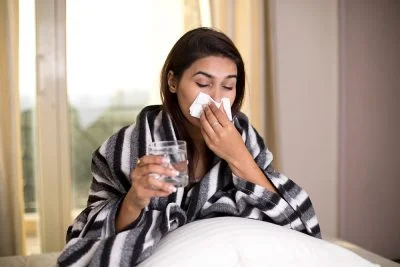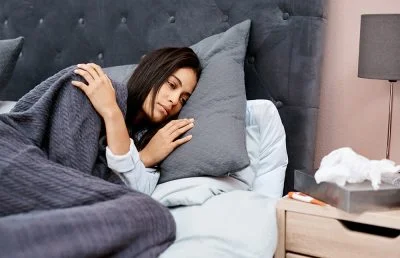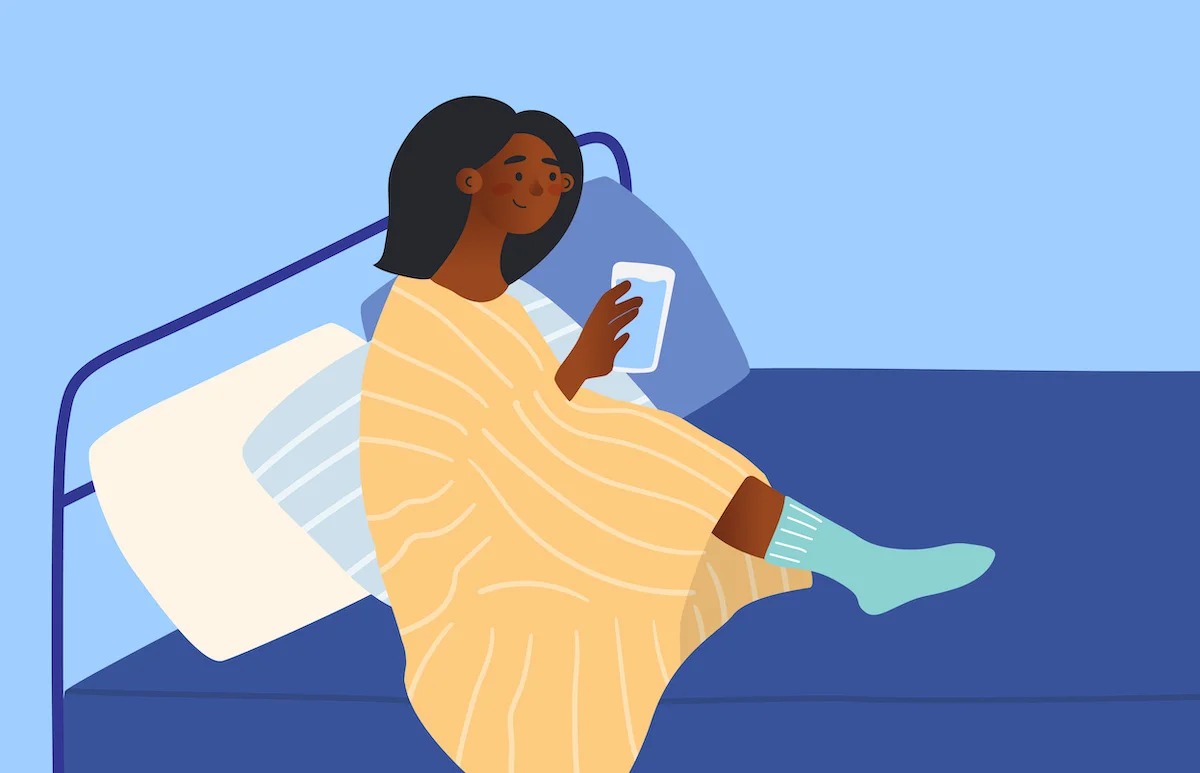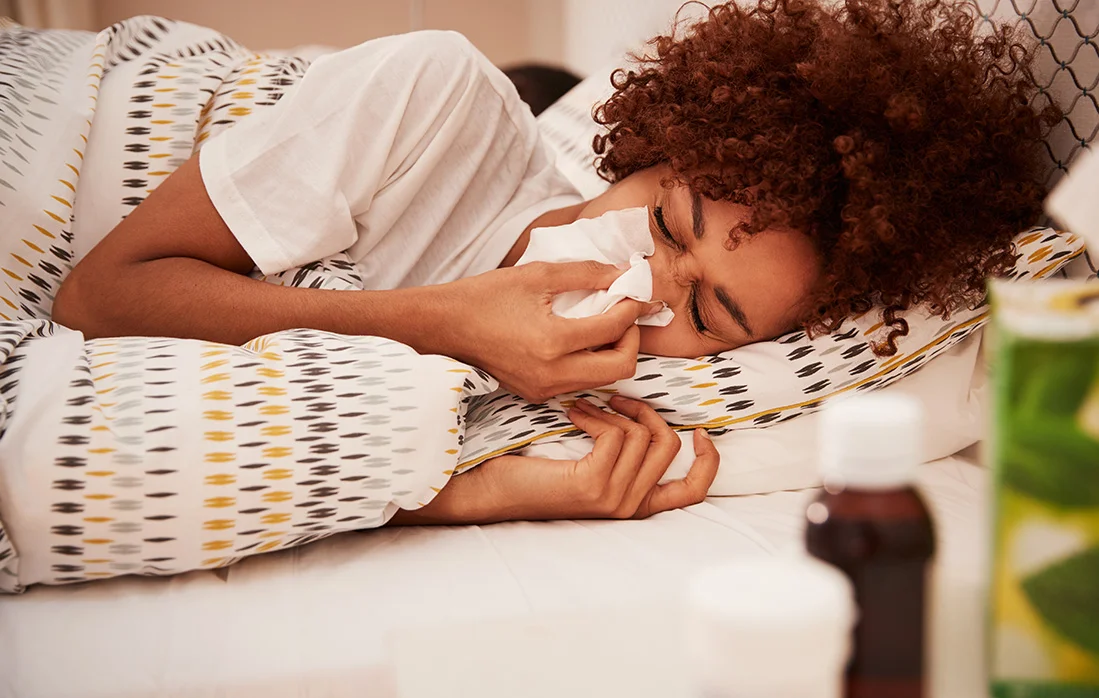You’re sniffly, feverish, or just generally feeling crummy, and all you want to do is sleep (but don’t blame sleeping with wet hair for your cold!). You might not be as productive as you usually are, but that prominent desire for sleep is actually a good thing. Here’s how sleep supports the immune system, and what you can do to sleep well — no matter how congested you get.

Why You Need More Sleep When You’re Sick
“When you’re sick, your body spends a lot of energy trying to fight off the infection, and sleep is a crucial part of that process,” says Dr. Raj Dasgupta, a quadruple board-certified physician who specializes in sleep. “The body’s immune system functions much more efficiently when you’re sleeping, and feeling sleepy or tired when you’re sick is a sign that your body needs to focus its energy on fighting the illness.”
When we sleep, our bodies work hard to recover and repair themselves, which is exactly what we need when we’re sick. As Dasgupta says, the body uses a lot of energy to fight off infection — when we sleep while we’re sick, it can focus more energy on getting better instead of diverting resources to move your body and get you through your typical daily tasks.
A lack of sleep has been shown to decrease immunity and make you more susceptible to additional illnesses, so the body’s need for more sleep when we’re sick is important for a robust immune system.
Can You Sleep Too Much When You’re Sick?
“You actually need more sleep when you’re sick, so it’s common for people to sleep more than usual while their body is healing,” says Dasgupta.
However, he adds that you should talk to your doctor if you’re not getting better despite plenty of sleep, or if you find that your symptoms improve but you’re still feeling excessively tired or lethargic. “Quality sleep while sick can help expedite the healing process,” he says, “but it’s still important to see a doctor for accurate diagnoses and appropriate treatment.”
Tips For Sleeping Better When Sick
Feeling sick can make you tired, but sometimes your illness makes it hard to get the sleep you’re craving. That’s especially true with symptoms like a stuffy nose, sinus congestion, or a chronic cough. Try these tips to get the sleep you need:
- Stay hydrated. Fluids can help decrease nasal irritation from all that coughing and sneezing. Plus, proper hydration supports the immune system.

- Go to bed early. If you’re feeling tired when you’re sick, listen to your body. It’s telling you it needs to power down so it can focus on fighting off your illness.
- Flush out your nasal passages. Irrigating the sinuses with a tool like a neti pot can help relieve congestion, making it easier to fall asleep.
- Sleep with a humidifier. “Using a humidifier in your bedroom when you’re sick could help soothe any irritation from a dry nose or throat,” Dasgupta says. “Increasing the amount of moisture in the air can also help with loosening congestion and mucus, making breathing easier and more comfortable.”
- Take a hot shower or bath before bed. Similar to the humidifier, this will generate steam that opens the airways and eases congestion.
- Sleep with your head propped up. “If you are congested, you can try using a wedge pillow to help keep your head elevated and encourage drainage,” Dasgupta says.
- If you’re taking medication, make sure it’s specifically formulated for nighttime use. Some over-the-counter medications are non-drowsy formulas, which could make it hard to fall asleep. Look for those that are designed for bedtime.
- Try certain teas to induce sleep or soothe symptoms. A warm cup of chamomile tea is a relaxing bedtime ritual, and you can add a squeeze of lemon and some honey for throat-soothing benefits.
- When you wake up during the night, respond to whatever is bothering you quickly so you can go back to sleep more easily.
- Maintain good sleep hygiene. “Make sure your sleeping environment is cool, dark, and quiet to help you get the best sleep while sick,” Dasgupta says. This ideal environment should make it easier for you to get the rest you need. He also cautions against turning up the temperature despite feeling chilly while you’re sick. “Chills and shivering are part of the body’s natural reactions to having a fever,” he says. “Although you may be tempted to bundle up, use thick blankets, or turn the heat up, it’s best to avoid taking those steps so that your body does not overheat.”
Best Sleep Positions For Sleeping While Sick

Dasgupta the best sleeping positions while you’re sick are the ones you’re most comfortable in — and the ones that make it easiest for you to get some sleep.
“However, if you are experiencing a stuffy or runny nose, sleeping with your head and neck slightly elevated can help ease congestion and promote mucus drainage,” he adds. Sleeping on your side can also help drain mucus and prevent airway obstruction.
When To Consult A Doctor
If your symptoms aren’t getting better even with plenty of rest, or you have a fever over 104 F, it’s time to see a doctor. You should also consult your doctor if you find that your illness is improving, but you’re still feeling really run down and tired.
If you have a high fever over 104 F, you should contact your doctor.
The Last Word From Sleepopolis
Nobody likes getting sick and feeling down for the count. The good news is, you can rest guilt free: getting more sleep when you’re sick is actually a good thing — it helps in your recovery by boosting your immune system. Long story short: If you’re sick, snooze away!

The Complete Guide to Hydration and Sleep

The Best Sleeping Positions For Sinus Drainage

How To Sleep With A Cough



























